#chinese new year 2021
Explore tagged Tumblr posts
Text

Character design🐅 Don't think I ever gave her a name tho.
#oc#doodle#digital art#digital drawing#original character#character design#digital doodle#chinese new year 2021#year of the tiger
22 notes
·
View notes
Text


Chinese New Year animals from past years.
#chinese new year#metal rat#water tiger#I didn't get to draw the Ox from 2021#but looking forward to drawing the Dragon next year.
19 notes
·
View notes
Text
The Best News of Last Month - July 2024
🏅- Talk about an Olympic comeback!
1. U.S. proposes ban on airline fees for seating parents next to kids

Parents should't have to pay a fee to sit next to their children when flying, according to the White House, which is moving to ban airlines from charging families extra to be seated together.
Under a rule proposed Thursday by the Department of Transportation, airlines would be required to seat parents and kids 13 and younger together free of charge when adjacent seating is available at booking.
2. A spinal injury killed Adriana Ruano's dream as a gymnast. She just won Guatemala's first Olympic gold medal as a shooter.

Ruano was training for the 2011 world championships in gymnastics, a qualifier for the London Olympics the following year, when she felt pain in her back. An MRI showed the then-16-year-old had six damaged vertebrae — a career-ending injury.
But on Wednesday, she came back as a shooter and won Guatemala's first Olympic gold medal.
3. Woman swept out to sea rescued after surviving 37 hours in 6.5' waves, drifted over 50 miles.

A Chinese woman who was swept out to sea while swimming at a Japanese beach was rescued 37 hours later after drifting in an inflatable swim ring more than 80 kilometers (50 miles) in the Pacific Ocean, officials said Thursday.
4. Afghan Sisters Escape The Taliban To Achieve Olympic Dreams

Sisters Yulduz and Fariba Hashimi are set to become the first female cyclists from Afghanistan to compete in the Olympics. The siblings fled their country after the Taliban seized power in 2021 and cracked down on women's rights, including banning women from participating in sports.
5. Stem cell therapy cures man with type 2 diabetes

A 59-year-old man had been suffering from diabetes for 25 years, needing more and more insulin every day to avoid slipping into a diabetic coma and was at risk of death. But then Chinese researchers cured his disease for the first time in the world. The patient received a cell transplant in 2021 and has not taken any medication since 2022.
6. Seventh person likely 'cured' of HIV, doctors announce

A 60-year-old German man is likely the seventh person to be effectively cured from HIV after receiving a stem cell transplant, doctors announced on Thursday. The man received a bone marrow transplant for his leukaemia in 2015. The procedure, which has a 10 percent risk of death, essentially replaces a person's immune system.
7. Every country has now banned the use of leaded gasoline in cars

Three and a half decades later, in 2021, Algeria became the last country to ban it. Leaded gasoline is now banned from being used in road vehicles in every country. It is a big win for the health of people around the world.
----------
That's it for this month :)
This newsletter will always be free. If you liked this post you can support me with a small kofi donation here:
Buy me a coffee ❤️
Also don’t forget to share this post with your friends.
1K notes
·
View notes
Text
"In China, a landscape architect is reimagining cities across the vast country by working with nature to combat flooding through the ‘sponge city’ concept.
Through his architecture firm Turenscape, Yu has created hundreds of projects in dozens of cities using native plants, dirt, and clever planning to absorb excess rainwater and channel it away from densely populated areas.
Flooding, especially in the two Chinese heartlands of the commercial south and the agricultural north, is becoming increasingly common, but Yu says that concrete and pipe solutions can only go so far. They’re inflexible, expensive, and require constant maintenance. According to a 2021 World Bank report, 641 of China’s 654 largest cities face regular flooding.
“There’s a misconception that if we can build a flood wall higher and higher, or if we build the dams higher and stronger, we can protect a city from flooding,” Yu told CNN in a video call. “(We think) we can control the water… that is a mistake.”

Pictured: The Benjakitti Forest Park in Bangkok
Yu has been called the “Chinese Olmstead” referring to Frederick Law Olmstead, the designer of NYC’s Central Park. He grew up in a little farming village of 500 people in Zhejiang Province, where 36 weirs channel the waters of a creek across terraced rice paddies.
Once a year, carp would migrate upstream and Yu always looked forward to seeing them leap over the weirs.
This synthesis of man and nature is something that Turenscape projects encapsulate. These include The Nanchang Fish Tail Park, in China’s Jiangxi province, Red Ribbon Park in Qinghuandao, Hebei province, the Sanya Mangrove Park in China’s island province of Hainan, and almost a thousand others. In all cases, Yu utilizes native plants that don’t need any care to develop extremely spongey ground that absorbs excess rainfall.
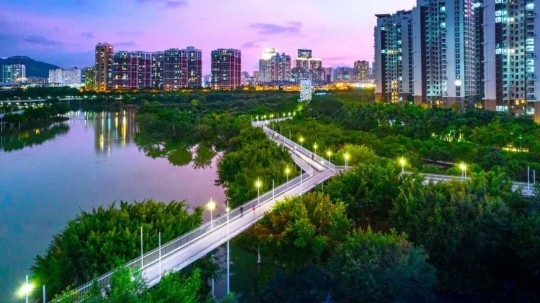
Pictured: The Dong’an Wetland Park, another Turescape project in Sanya.
He often builds sponge projects on top of polluted or abandoned areas, giving his work an aspect of reclamation. The Nanchang Fish Tail Park for example was built across a 124-acre polluted former fish farm and coal ash dump site. Small islands with dawn redwoods and two types of cypress attract local wildlife to the metropolis of 6 million people.
Sanya Mangrove Park was built over an old concrete sea wall, a barren fish farm, and a nearby brownfield site to create a ‘living’ sea wall.
One hectare (2.47 acres) of Turenscape sponge land can naturally clean 800 tons of polluted water to the point that it is safe enough to swim in, and as a result, many of the sponge projects have become extremely popular with locals.
One of the reasons Yu likes these ideas over grand infrastructure projects is that they are flexible and can be deployed as needed to specific areas, creating a web of rain sponges. If a large drainage, dam, seawall, or canal is built in the wrong place, it represents a huge waste of time and money.

Pictured: A walkway leads visitors through the Nanchang Fish Tail Park.
The sponge city projects in Wuhan created by Turenscape and others cost in total around half a billion dollars less than proposed concrete ideas. Now there are over 300 sponge projects in Wuhan, including urban gardens, parks, and green spaces, all of which divert water into artificial lakes and ponds or capture it in soil which is then released more slowly into the sewer system.
Last year, The Cultural Landscape Foundation awarded Yu the $100,000 Oberlander Prize for elevating the role of design in the process of creating nature-based solutions for the public’s enjoyment and benefit."
-via Good News Network, August 15, 2024
#china#wuhan#thailand#bangkok#landscape#wetlands#sponge city#landscape architecture#flooding#climate action#parks#public park#green architecture#sustainability#good news#hope
1K notes
·
View notes
Text
Lina Khan’s future is the future of the Democratic Party — and America
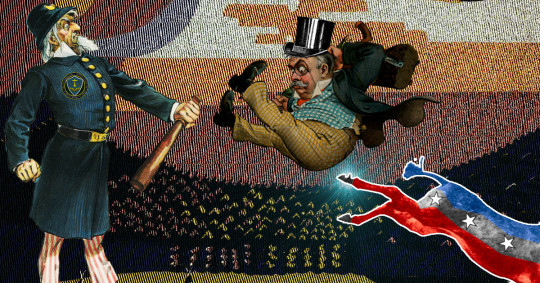
On OCTOBER 23 at 7PM, I'll be in DECATUR, presenting my novel THE BEZZLE at EAGLE EYE BOOKS.

On the one hand, the anti-monopoly movement has a future no matter who wins the 2024 election – that's true even if Kamala Harris wins but heeds the calls from billionaire donors to fire Lina Khan and her fellow trustbusters.
In part, that's because US antitrust laws have broad "private rights of action" that allow individuals and companies to sue one another for monopolistic conduct, even if top government officials are turning a blind eye. It's true that from the Reagan era to the Biden era, these private suits were few and far between, and the cases that were brought often died in a federal courtroom. But the past four years has seen a resurgence of antitrust rage that runs from left to right, and from individuals to the C-suites of big companies, driving a wave of private cases that are prevailing in the courts, upending the pro-monopoly precedents that billionaires procured by offering free "continuing education" antitrust training to 40% of the Federal judiciary:
https://pluralistic.net/2021/08/13/post-bork-era/#manne-down
It's amazing to see the DoJ racking up huge wins against Google's monopolistic conduct, sure, but first blood went to Epic, who won a historic victory over Google in federal court six months before the DoJ's win, which led to the court ordering Google to open up its app store:
https://www.theverge.com/policy/2024/10/7/24243316/epic-google-permanent-injunction-ruling-third-party-stores
Google's 30% App Tax is a giant drag on all kinds of sectors, as is its veto over which software Android users get to see, so Epic's win is going to dramatically alter the situation for all kinds of activities, from beleaguered indie game devs:
https://antiidlereborn.com/news/
To the entire news sector:
https://www.eff.org/deeplinks/2023/06/save-news-we-must-open-app-stores
Private antitrust cases have attracted some very surprising plaintiffs, like Michael Jordan, whose long policy of apoliticism crumbled once he bought a NASCAR team and lived through the monopoly abuses of sports leagues as an owner, not a player:
https://www.thebignewsletter.com/p/michael-jordan-anti-monopolist
A much weirder and more unlikely antitrust plaintiff than Michael Jordan is Google, the perennial antitrust defendant. Google has brought a complaint against Microsoft in the EU, based on Microsoft's extremely ugly monopolistic cloud business:
https://www.reuters.com/technology/google-files-complaint-eu-over-microsoft-cloud-practices-2024-09-25/
Google's choice of venue here highlights another reason to think that the antitrust surge will continue irrespective of US politics: antitrust is global. Antitrust fervor has seized governments from the UK to the EU to South Korea to Japan. All of those countries have extremely similar antitrust laws, because they all had their statute books overhauled by US technocrats as part of the Marshall Plan, so they have the same statutory tools as the American trustbusters who dismantled Standard Oil and AT&T, and who are making ready to shatter Google into several competing businesses:
https://www.theverge.com/2024/10/8/24265832/google-search-antitrust-remedies-framework-android-chrome-play
Antitrust fever has spread to Canada, Australia, and even China, where the Cyberspace Directive bans Chinese tech giants from breaking interoperability to freeze out Chinese startups. Anything that can't go on forever eventually stops, and the cost of 40 years of pro-monopoly can't be ignored. Monopolies make the whole world more brittle, even as the cost of that brittleness mounts. It's hard to pretend monopolies are fine when a single hurricane can wipe out the entire country's supply of IV fluid – again:
https://prospect.org/health/2024-10-11-cant-believe-im-writing-about-iv-fluid-again/
What's more, the conduct of global monopolists is the same in every country where they have taken hold, which means that trustbusters in the EU can use the UK Digital Markets Unit's report on the mobile app market as a roadmap for their enforcement actions against Apple:
https://assets.publishing.service.gov.uk/media/63f61bc0d3bf7f62e8c34a02/Mobile_Ecosystems_Final_Report_amended_2.pdf
And then the South Korean and Japanese trustbusters can translate the court documents from the EU's enforcement action and use them to score victories over Apple in their own courts:
https://pluralistic.net/2024/04/10/an-injury-to-one/#is-an-injury-to-all
So on the one hand, the trustbusting wave will continue erode the foundations of global monopolies, no matter what happens after this election. But on the other hand, if Harris wins and then fires Biden's top trustbusters to appease her billionaire donors, things are going to get ugly.
A new, excellent long-form Bloomberg article by Josh Eidelson and Max Chafkin gives a sense of the battle raging just below the surface of the Democratic Power, built around a superb interview with Khan herself:
https://www.bloomberg.com/news/features/2024-10-09/lina-khan-on-a-second-ftc-term-ai-price-gouging-data-privacy
The article begins with a litany of tech billionaires who've gone an all-out, public assault on Khan's leadership – billionaires who stand to personally lose hundreds of millions of dollars from her agency's principled, vital antitrust work, but who cloak their objection to Khan in rhetoric about defending the American economy. In public, some of these billionaires are icily polite, but many of them degenerate into frothing, toddler-grade name-calling, like IAB's Barry Diller, who called her a "dope" and Musk lickspittle Jason Calacanis, who called her an all-caps COMMUNIST and a LUNATIC.
The overall vibe from these wreckers? "How dare the FTC do things?!"
And you know, they have a point. For decades, the FTC was – in the quoted words of Tim Wu – "a very hardworking agency that did nothing." This was the period when the FTC targeted low-level scammers while turning a blind eye to the monsters that were devouring the US economy. In part, that was because the FTC had been starved of budget, trapping them in a cycle of racking up easy, largely pointless "wins" against penny-ante grifters to justify their existence, but never to the extent that Congress would apportion them the funds to tackle the really serious cases (if this sounds familiar, it's also the what happened during the long period when the IRS chased middle class taxpayers over minor filing errors, while ignoring the billionaires and giant corporations that engaged in 7- and 8-figure tax scams).
But the FTC wasn't merely underfunded: it was timid. The FTC has extremely broad enforcement and rulemaking powers, which most sat dormant during the neoliberal era:
https://pluralistic.net/2023/01/10/the-courage-to-govern/#whos-in-charge
The Biden administration didn't merely increase the FTC's funding: in choosing Khan to helm the organization, they brought onboard a skilled technician, who was both well-versed in the extensive but unused powers of the agency and determined to use them:
https://pluralistic.net/2022/10/18/administrative-competence/#i-know-stuff
But Khan's didn't just rely on technical chops and resources to begin the de-olicharchification of the US economy: she built a three-legged stool, whose third leg is narrative. Khan's signature is her in-person and remote "listening tours," where workers who've been harmed by corporate power get to tell their stories. Bloomberg recounts the story of Deborah Brantley, who was sexually harassed and threatened by her bosses at Kavasutra North Palm Beach. Brantley's bosses touched her inappropriately and "joked" about drugging her and raping her so she "won’t be such a bitch and then maybe people would like you more."
When Brantley finally quit and took a job bartending at a different business, Kavasutra sued her over her noncompete clause, alleging an "irreparable injury" sustained by having one of their former employees working at another business, seeking damages and fees.
The vast majority of the 30 million American workers who labor under noncompetes are like Brantley, low-waged service workers, especially at fast-food restaurants (so Wendy's franchisees can stop minimum wage cashiers from earning $0.25/hour more flipping burgers at a nearby McDonald's). The donor-class indenturers who defend noncompetes claim that noncompetes are necessary to protect "innovative" businesses from losing their "IP." But of course, the one state where no workers are subject to noncompetes is California, which bans them outright – the state that is also home to Silicon Valley, an IP-heave industry that the same billionaires laud for its innovations.
After that listening tour, Khan's FTC banned noncompetes nationwide:
https://pluralistic.net/2024/04/25/capri-v-tapestry/#aiming-at-dollars-not-men
Only to have a federal judge in Texas throw out their ban, a move that will see $300b/year transfered from workers to shareholders, and block the formation of 8,500 new US businesses every year:
https://www.npr.org/2024/08/21/g-s1-18376/federal-judge-tosses-ftc-noncompetes-ban
Notwithstanding court victories like Epic v Google and DoJ v Google, America's oligarchs have the courts on their side, thanks to decades of court-packing planned by the Federalist Society and executed by Senate Republicans and Reagan, Bush I, Bush II, and Trump. Khan understands this; she told Bloomberg that she's a "close student" of the tactics Reagan used to transform American society, admiring his effectiveness while hating his results. Like other transformative presidents, good and bad, Reagan had to fight the judiciary and entrenched institutions (as did FDR and Lincoln). Erasing Reagan's legacy is a long-term project, a battle of inches that will involve mustering broad political support for the cause of a freer, more equal America.
Neither Biden nor Khan are responsible for the groundswell of US – and global – movement to euthanize our rentier overlords. This is a moment whose time has come; a fact demonstrated by the tens of thousands of working Americans who filled the FTC's noncompete docket with outraged comments. People understand that corporate looters – not "the economy" or "the forces of history" – are the reason that the businesses where they worked and shopped were destroyed by private equity goons who amassed intergenerational, dynastic fortunes by strip-mining the real economy and leaving behind rubble.
Like the billionaires publicly demanding that Harris fire Khan, private equity bosses can't stop making tone-deaf, guillotine-conjuring pronouncements about their own virtue and the righteousness of their businesses. They don't just want to destroy the world - they want to be praised for it:/p>
"Private equity’s been a great thing for America" -Stephen Pagliuca, co-chairman of Bain Capital;
"We are taught to judge the success of a society by how it deals with the least able, most vulnerable members of that society. Shouldn’t we judge a society by how they treat the most successful? Do we vilify, tax, expropriate and condemn those who have succeeded, or do we celebrate economic success as the engine that propels our society toward greater collective well-being?" -Marc Rowan, CEO of Apollo
"Achieve life-changing money and power," -Sachin Khajuria, former partner at Apollo
Meanwhile, the "buy, strip and flip" model continues to chew its way through America. When PE buys up all the treatment centers for kids with behavioral problems, they hack away at staffing and oversight, turning them into nightmares where kids are routinely abused, raped and murdered:
https://www.nbcnews.com/news/us-news/they-told-me-it-was-going-be-good-place-allega-tions-n987176
When PE buys up nursing homes, the same thing happens, with elderly residents left to sit in their own excrement and then die:
https://www.politico.com/news/magazine/2023/12/24/nursing-homes-private-equity-fraud-00132001
Writing in The Guardian, Alex Blasdel lays out the case for private equity as a kind of virus that infects economies, parasitically draining them of not just the capacity to provide goods and services, but also of the ability to govern themselves, as politicians and regulators are captured by the unfathomable sums that PE flushes into the political process:
https://www.theguardian.com/business/2024/oct/10/slash-and-burn-is-private-equity-out-of-control
Now, the average worker who's just lost their job may not understand "divi recaps" or "2-and-20" or "carried interest tax loopholes," but they do understand that something is deeply rotten in the world today.
What happens to that understanding is a matter of politics. The Republicans – firmly affiliated with, and beloved of, the wreckers – have chosen an easy path to capitalizing on the rising rage. All they need to do is convince the public that the system is irredeemably corrupt and that the government can't possibly fix anything (hence Reagan's asinine "joke": "the nine most terrifying words in the English language are: 'I'm from the Government, and I'm here to help'").
This is a very canny strategy. If you are the party of "governments are intrinsically corrupt and incompetent," then governing corruptly and incompetently proves your point. The GOP strategy is to create a nation of enraged nihilists who don't even imagine that the government could do something to hold their bosses to account – not for labor abuses, not for pollution, not for wage theft or bribery.
The fact that successive neoliberal governments – including Democratic administrations – acted time and again to bear out this hypothesis makes it easy for this kind of nihilism to take hold.
Far-right conspiracies about pharma bosses colluding with corrupt FDA officials to poison us with vaccines for profit owe their success to the lived experience of millions of Americans who lost loved ones to a conspiracy between pharma bosses and corrupt officials to poison us with opioids.
Unhinged beliefs that "they" caused the hurricanes tearing through Florida and Georgia and that Kamala Harris is capping compensation to people who lost their homes are only credible because of murderous Republican fumble during Katrina; and the larcenous collusion of Democrats to help banks steal Americans' homes during the foreclosure crisis, when Obama took Tim Geithner's advice to "foam the runway" with the mortgages of everyday Americans who'd been cheated by their banks:
https://www.salon.com/2014/05/14/this_man_made_millions_suffer_tim_geithners_sorry_legacy_on_housing/
If Harris gives in to billionaire donors and fires Khan and her fellow trustbusters, paving the way for more looting and scamming, the result will be more nihilism, which is to say, more electoral victories for the GOP. The "government can't do anything" party already exists. There are no votes to be gained by billing yourself as the "we also think governments can't do anything" party.
In other words, a world where Khan doesn't run the FTC is a world where antitrust continues to gain ground, but without taking Democrats with it. It's a world where nihilism wins.
There's factions of the Democratic Party who understand this. AOC warned party leaders that, "Anyone goes near Lina Khan and there will be an out and out brawl":
https://twitter.com/AOC/status/1844034727935988155
And Bernie Sanders called her "the best FTC Chair in modern history":
https://twitter.com/SenSanders/status/1843733298960576652
In other words: Lina Khan as a posse.

Tor Books as just published two new, free LITTLE BROTHER stories: VIGILANT, about creepy surveillance in distance education; and SPILL, about oil pipelines and indigenous landback.


If you'd like an essay-formatted version of this post to read or share, here's a link to it on pluralistic.net, my surveillance-free, ad-free, tracker-free blog:
https://pluralistic.net/2024/10/11/democracys-antitrust-paradox/#there-will-be-an-out-and-out-brawl
#pluralistic#ftc#lina khan#democratic party#elections#kamala harris#billionaires#trustbusting#competition#labor#noncompetes#silicon valley#aoc
407 notes
·
View notes
Text
ROBERT REICH
MAR 14
Friends,
It seems as if the horrendous Trump news doesn’t end — and it doesn’t. We’ve barely endured just over seven weeks of his scourge and every day brings new awfulness.
But the worse it gets, the more Trump, Musk, and the rest of the oligarchy reveal themselves. And the more they reveal themselves — the more they abuse their wealth and power, side with Putin, trample civil liberties, and ride roughshod over the Constitution — the stronger the backlash against them will be.
Here’s this week’s summary of 10 reasons for very modest optimism.
1. The Trump slump is worsening.
The first reason for very modest optimism is the current bad economic news. Americans voted for Trump because they thought he’d fix the economy. Many are now suffering buyer’s remorse.
On Monday, in retaliation for Trump’s tariffs on Chinese imports, China began imposing tariffs on a range of American farm products, including a 15 percent levy on chicken, wheat, and corn. This is already beginning to hurt the Farm Belt — mostly Republican states and Trump voters.
On Wednesday, after Trump’s 25 percent tariffs on all aluminum and steel imported into the U.S. went into effect, the European Union announced retaliatory tariffs on about $28 billion worth of products, including beef and whiskey — also mostly produced by Republican states (think Kentucky bourbon). Europe is also slapping tariffs on Harley-Davidson motorcycles, made in the Rust Belt.
In response this morning, Trump threatened a 200 percent tariff on all alcoholic products from EU member states. As a result, Trump voters — largely working-class — will be paying more.
Canada also announced new tariffs on about $21 billion worth of U.S. products.
What does this all mean for the economy?
In a Fox News interview that aired Sunday, Trump did not rule out the possibility that his policies would cause a recession. That possibility is growing by the day.
The stock market has continued to plummet. Yesterday, the S&P 500 fell 1.4 percent; the index is now down 10.1 percent from its peak reached less than one month ago and in a “correction” — Wall Street slang for when an index falls 10 percent or more from its peak and when investors worried about a sell-off gathering steam.
Other major indexes, including the Russell 2000 and the tech-heavy Nasdaq Composite, were already in correction territory.
The rest of the economy isn’t far behind.
Last Friday’s jobs report showed employers adding 151,000 jobs in February — half as many as in November and December. Leisure and hospitality jobs have declined in the past two months, suggesting that consumers are pulling back on discretionary spending.
The labor force participation rate also fell 0.2 percentage points, to 62.4 percent, mostly due to declining employment among men. The number of workers employed part-time who wanted but couldn’t get full-time work increased by 460,000 to 4.9 million, the most since spring 2021.
CEOs’ assessment of American business conditions is the lowest since the spring of 2020. The New York Times monthly consumer survey finds households feeling gloomy about their year-ahead financial situations.
The Federal Reserve Bank of New York reported Monday that Americans are increasingly worried about the state of their finances. The perceived probability of missing a minimum debt payment over the next three months climbed to its highest level since April 2020, when the economy was in a Covid-19-related freefall.
Egg prices, an emerging symbol of America’s affordability crisis, jumped 10.4 percent last month after a big rise in January.
2. Trump’s support continues to tank.
The consequence of all this for Trump’s political support? It’s tanking. In the latest Emerson national poll, 46 percent of voters say his policies are making the economy worse rather than better, while 28 percent say the opposite (the rest had no opinion).
In a new CNN/SSRS poll, almost three-quarters of Americans view the current economic conditions in the U.S. as poor, 51 percent of the public say they think Trump’s policies have worsened economic conditions, and just 28 percent say that his policies have improved things.
In the same poll, the share of Americans saying they expect the economy to be in bad shape a year from now is up 7 points since January, just before Trump took office.
Fifty-five percent of Americans surveyed say they fear Trump’s cuts to federal programs will negatively affect the economy, and just over 50 percent say that they will negatively affect their own families or local communities.
In a new YouGov poll, 48 percent of Americans think the economy is getting worse, up from 37 percent at the start of Trump's second term. Forty-seven percent expect higher inflation in six months — more than twice the share six months ago.
In the latest Quinnipiac poll, 54 percent disapprove of Trump’s handling of the economy; only 41 percent approve.
In a new CNN poll, 56 percent of voters disapprove of Trump’s handling of the economy — higher than at any point during his first term. In addition, 61 percent disapprove of tariffs.
I don’t have huge trust in polls but when all major polls show the same thing, there’s reason to believe them.
3. Musk’s claimed savings don’t exist, and his businesses are going down the toilet.
Musk continues to claim big savings from his DOGE effort to take a chainsaw to government. But so far, the actual savings have proven to be tiny.
Soon there will be no way to tell, because Musk and DOGE have just stopped providing identifying details about the cuts — so there’s no way to fact-check them. Not only is this a major step backward from Musk’s promise that he’d be “maximally transparent,” but also it makes his claims of savings nothing but unverifiable propaganda.
DOGE has refused to answer Freedom of Information Act (FOIA) requests from journalists and watchdog groups. On Monday, though, a federal judge ruled that DOGE is likely subject to the FOIA — a win for journalists, watchdogs, and researchers who have demanded greater transparency. On Thursday, another judge ordered Musk and DOGE to turn over records and answer questions in response to a legal complaint filed by Democratic state attorneys general.
Meanwhile, Musk’s growing political power and his shift to the political hard right are damaging his businesses.
Consumers are boycotting Tesla. More than a dozen violent or destructive acts have been directed at Tesla facilities. Tesla’s stock has fallen by more than 35 percent since Trump’s inauguration; it’s down 50 percent since December.
Musk is so alarmed by this that he got Trump to hold a White House promotional event for Tesla this week — where Trump essentially read a Tesla sales pitch and lied that consumer boycotts are “illegal.”
In Germany, sales of Teslas plummeted 76 percent in February compared with a year earlier, according to figures released Wednesday.
Antipathy to Musk is also denting sales of his Starlink satellite internet business.
Musk raised alarms this past weekend when he wrote on X that Ukraine’s front line “would collapse” against Russian forces if Starlink were shut off.
Radoslaw Sikorski, Poland’s foreign minister, suggested that his country “will be forced to look for other suppliers” if Starlink is “unreliable.” Musk later told Sikorski to “be quiet, small man.”
Andrius Kubilius, the European Union commissioner overseeing defense and space, talked of quickly replacing Starlink if necessary.
Italy is having second thoughts about awarding a $1.6 billion contract to Starlink.
Over the past week, shares in Eutelsat — the French rival to Starlink — have more than tripled.
4. The FBI is moving to criminalize groups like Habitat for Humanity for receiving grants from the Environmental Protection Agency under the Biden administration.
I’m including this as a reason for optimism because it so clearly demonstrates just how absurd and extreme the Trump regime has become.
On Wednesday, Citibank revealed in a court filing that it was told to freeze Habitat for Humanity’s bank accounts, at the FBI’s request. The reason? The FBI alleges that the group is involved in “possible criminal violations,” including “conspiracy to defraud the United States.”
Habitat for Humanity, you may recall, is the group that builds low-income houses in America’s communities. Jimmy Carter worked with them for decades. What did they do to earn the FBI’s ire? They received a climate grant from the Biden administration’s EPA.
Other nonprofits also being targeted by the FBI for receiving climate grants include the Appalachian Community Capital Corporation, the Coalition for Green Capital, and the DC Green Bank.
Yet these groups’ applications for government grants for environmental work were fully reviewed and accepted by the Biden administration’s EPA.
This is not fraud. It’s targeted harassment. And it will be viewed that way by most Americans.
5. Trump’s “beautiful bill” is stranded.
Trump apparently believes that fees from his tariffs when added to savings from Musk’s budget cuts will enable him to finance another large tax cut mainly for big corporations and the wealthy.
Even if he’s correct (which seems extremely doubtful), those tariff fees are financed by American consumers who will be paying higher prices for imports and who’ll also be losing services because of Musk’s cuts. They are are largely working-class Trump voters. Talk about reverse Robin Hood.
Meanwhile, Republicans in control of the House and Senate are divided over the size of spending reductions that should accompany their pending tax cuts, which budgetary yardstick they use, and whether a debt-ceiling increase should be attached.
The Senate still hasn’t agreed to the House strategy to pass one bill that would address the fiscal matters along with border security, after months of debate over whether to split Trump’s priorities into two or even three party-line bills.
Until these questions are resolved with an agreement between House and Senate Republicans, Congress can’t unlock the door to the fast-track “reconciliation” process that circumvents Senate Democrats. And until they unlock that door — which could take weeks or months — Trump’s “one big, beautiful bill” is stranded.
6. Bernie is rallying the Democrats
On Friday night, Bernie Sanders drew a crowd of 4,000 in Kenosha, Wisconsin, in what he calls his “Stop Oligarchy Tour.” On Saturday morning, another 2,600 in Altoona, Wisconsin, a town of less than 10,000 residents. Then 9,000 in suburban Detroit, where United Auto Workers President Shawn Fain introduced him.
Each stop has been in a swing House district represented by a Republican.
Rep. Alexandria Ocasio-Cortez will join Bernie on the road in the coming weeks. She’s also planning solo appearances in Republican-held congressional districts in Pennsylvania and New York and other districts where Republicans have declined to hold in-person town halls because they might face protests.
Elizabeth Warren and Greg Casar headlined a 3,500-person rally in Austin,Texas — the heart of Musk’s business empire.
Tim Walz and many House Democrats will host town halls in GOP districts where their Republican congressmen are avoiding town halls.
Bernie is showing Democratic lawmakers and prospective candidates how hungry Americans are for a strong counteroffensive against Trump and Musk — in contrast to Democratic political operative James Carville’s suggestion that Democrats “roll over and play dead,” and Minority Leader Chuck Schumer’s willingness to surrender to Republicans on the budget resolution.
7. A coalition of 21 Democratic attorneys general has sued Trump, and the federal courts are becoming even more active in stopping him.
On Thursday — two days after the Education Department fired more than 1,300 workers, purging people who administer grants and track student achievement across America — a coalition of Democratic attorneys general sued the Trump regime, saying that the dismissals were “illegal and unconstitutional.”
The coalition is seeking a court order to stop what it calls “policies to dismantle” the department.
Meanwhile, Judge Beryl Howell of the U.S. District Court for the District of Columbia condemned Trump’s executive order punishing law firms that have had Democratic clients, such as special counsel Jack Smith — denying their attorneys access to federal buildings and stripping them of government contracts.
On Thursday, U.S. District Judge William Alsup ordered federal agencies to rehire tens of thousands of probationary employees who have been fired by Trump. Judge Alsup described the mass firings as a “sham” strategy by Trump’s Office of Personnel Management to sidestep legal requirements for reducing the federal workforce.
Alsup ordered that probationary employees across DOD, Treasury, Energy, Interior, Agriculture, and the VA be hired back “immediately.” Alsup also lashed out at the Justice Department over its handling of the case, saying Trump lawyers were hiding the facts about who directed the mass firings.
Another federal judge has blocked the deportation of Columbia University graduate student Mahmoud Khalil, whose green card was voided by the Trump regime and was then imprisoned for his political views.
8. Oligarchs are revealing themselves for who they really are.
This week further revealed how the American oligarchy is using their wealth to curry favor with Trump. Some examples:
Jeff Bezos has decided to stream all seven seasons of Trump’s former reality show, “The Apprentice,” on Amazon Prime. Trump was an executive producer and is likely to receive royalties from the agreement. He even plugged the deal on Truth Social.
Bezos’s Amazon is also paying $40 million for a documentary about the life of Melania Trump. According to The Wall Street Journal, she’s set to make $28 million from the deal.
Bezos has also washed his Washington Post clean of any op-eds critical of Trump (leading to the resignation of some of its top opinion writers, such as Ruth Marcus) and refuses to carry ads critical of Trump.
Meanwhile, Musk, the wealthiest person in the world, who spent more than $250 million to help elect Trump, is donating an additional $100 million to help further Trump’s agenda.
9. Other nations are uniting against Trump, and the global right is losing ground.
It’s also become apparent this week that Trump is, ironically, the great unifier of Europe. Trump’s policies have helped leaders who were struggling with stagnant economies and rightwing opponents. Facing down American tariffs and drawing together to confront an ally that is behaving more like an adversary has proved to be good politics.
British Prime Minister Keir Starmer’s whirlwind of diplomacy — trying to marshal a European peacekeeping force for Ukraine while also working to salvage the alliance with Washington — has won him praise across Britain’s political spectrum. Starmer’s poll numbers have bounced back from what was a dismal first six months in government.
In Mexico, President Claudia Sheinbaum has won praise and stratospheric poll numbers for her coolheaded handling of Trump’s tariffs. Mark Carney, a former central banker, was catapulted to the leadership of Canada’s Liberal Party with 86 percent of the vote on the belief that he can manage a trade war with the United States.
Carney’s party, which lagged the Conservatives by double digits under the premiership of Justin Trudeau, has recently closed the gap, putting the Liberals within striking distance of a victory in an election that Carney is expected to call soon. The Conservative leader, Pierre Poilievre, has struggled to regain momentum, and Liberals have been quick to paint him as a Canadian Trump.
10. Americans will soon feel the effects of the Trump-Musk chainsaw.
Most Americans don’t care terribly much that government workers are being axed, but they do care about government services being axed. They’re about to feel those effects very soon. This is also cause for modest optimism because the sooner most people feel those effects, the stronger will be the backlash against the Trump regime. Consider, for example:
— Weather. The National Weather Service produces lifesaving forecasts, but Trump is cutting 20 percent of the National Oceanic and Atmospheric Administration — hobbling weather forecasts.
— Food stamps. Millions of poor families, many in red states, rely on Supplemental Nutrition Assistance — food stamps — to have enough to eat. The Trump regime is making substantial cuts and wants states to make up the difference. Most red states cannot.
— Veterans benefits. Over 9 million veterans depend on benefits from the Veterans Administration. But Trump’s cuts at the VA have disrupted medical treatment, ended studies involving experimental treatments, forced some facilities to fire support staff, and created uncertainty amid the mass cancellation of hundreds of VA contracts. The VA serves a constituency courted heavily by Republicans. Veterans, including Republican-leaning vet groups, are fighting back against Trump’s VA cuts.
— Measles. With lower rates of vaccination against measles and a vaccine skeptic at the helm at HHS, we’re witnessing significant measles outbreaks in Texas and New Mexico that have infected more than 250 people — many of them unvaccinated school-age children — and claimed two lives; a flu season that led to record numbers of hospitalizations; and the potential for a bird flu epidemic.
— Tuberculosis. Americans are vulnerable to communicable diseases that exist in other nations, such as tuberculosis, which kills more people worldwide than any other infectious disease. But since Trump ordered the freeze on USAID, the entire system of finding and treating TB has collapsed in dozens of countries across Africa and Asia.
— Education. On Tuesday, Trump and Musk fired half the Education Department, purging people who administer grants and track student achievement across America. Education cuts will hurt red states in particular: States that voted for Trump last November, on average, use more federal funding in their education apportions than states that voted for former Vice President Harris.
— Social Security. More than 100 million Americans depend on Social Security. But Musk’s DOGE is now combing through Social Security databases to flag suspicious payments. Musk describes Social Security as rife with fraud and repeats the conspiracy theory that Democrats have used it as a “gigantic magnet to attract illegal immigrants and have them stay in the country.” Earlier this month, he referred to Social Security as “the biggest Ponzi scheme of all time.”
This week, DOGE tried to eliminate Social Security’s phone customer service, only to scrap the plan after massive public backlash (although DOGE is still cutting phone options for direct deposit changes).
***
I offer you these reasons for very modest hope not because I want you to deny the awfulness of what’s occurring, but because I want you to see we are not necessarily doomed. Not all is lost. There are reasons to believe that the vast majority of Americans are catching on. And if that’s the case, the scourge will be over. We may even be stronger for having gone through it.
92 notes
·
View notes
Text
In this house, we cheer Musk
Elon Musk is so skilled he makes it look easy to run SpaceX and a majority of the world's orbital lift, and this leads a lot of people to underestimate him. "He doesn't do shit, he just pays the engineers!" critics say. "I could have done the same if I had a billion dollars!" they imagine.
Well, such critics should pay more attention to Blue Origin, which demonstrates that "just" paying the engineers a billion dollars is not enough.
Blue Origin is a spaceflight company founded by billionaire Jeff Bezos in 2000, two years before SpaceX in 2002. Both spent some time laying groundwork and did their first test launches in 2006, the New Shepard and the Falcon 1 respectively.
SpaceX pushed ahead rapidly and first reached orbit in 2008 with the fourth flight of a Falcon 1. Blue Origin was slower, and first reached orbit in 2025 with the New Glenn. In the intervening time, SpaceX had accomplished several hundred orbital flights and increased its launch pace from "per year" to "per week". (130-something Falcon 9 launches in 2024.)
SpaceX also hit several other milestones like supplying the ISS with the Dragon 1 in 2012, first propulsive (vertical) landing of an orbital rocket stage with Falcon 9 in 2015, taking humans to orbit with the Dragon 2 in 2020. On a more abstract but also more practical note, SpaceX's Booster 1051 went from hopeful "it landed and we might reuse it" plans to definite "cycle it back into service, you know the drill" when it was reused for the tenth time in 2021.
Harder to measure is how much SpaceX decreased the cost of launching people and things to orbit for all their customers, but it's somewhere around an order of magnitude thanks to the combination of mass production and rocket reuse, where previous orbital launches tended to be artisanal one-offs. And it's still dropping.
I will return to that 'majority' point: consider the US and Soviet/Russian space program which are the two big ones, and the Chinese and Indian and Japanese and other government space programs too. Add the private competitors, like Orbital Sciences Corporation which put their Pegasus in orbit in 1990 and went on to relative success with several more orbital missions.
SpaceX first reached orbit in 2008, and by 2024 was outdoing all the above put together. This does not happen by simply throwing money at the problem, the Great Powers have far more money to throw at the problem. This was not replicated by competitors. You can tell nobody even got close, for SpaceX to perform a majority.
Blue Origin? eventually got to orbit this year, planning another launch later this year. Orbital Sciences Corporation that I mentioned above? shut down. Space Services Inc.? technically reached space in the sense of the Karman line (100km up) but not orbit, then shut down. Armadillo Aerospace? never made it.
Wealthy and technically competent people like John Carmack (better known for Id Software, Doom) tried to run private spaceflight companies, lost a lot of money and shut down with little to show for it. Most of them are forgotten quickly. Elon Musk has put SpaceX so far ahead of the real alternatives, people lose sight of those and start comparing him to imaginary alternatives.
95 notes
·
View notes
Note
hi i love your blog and the stuff you've shared has been really invaluable for me writing my dissertation right now! i was wondering if you've ever read anything interesting about police horses, or perhaps horses working for the state more generally? apologies if you've already made a post about this and i've missed it.
Nice. Don't know if your dissertation is specifically about horse histories; if so, then I'd imagine you already know much more than I do. So I don't know how much help I can be.
I've posted about the history of police horses in Australia before, which is just excerpts from Stephen Gapps and Mina Murray, in their "From colonial cavalry to mounted police: a short history of the Australian police horse" (The Conversation, 28 July 2021; "Horse Patrol" aka "Mounted Police" formally established 1825 after Wiradjuri war, used to round-up escaped laborers and attack Aboriginal communities as crucial force in colonial admin in 1830s culminating in Waterloo Creek Massacre.)
I've made some references to US participation in British campaigns of Boer War. (Apparently there was a micro-industry of the New Orleans port shipping 110,000 horses and 81,000 mules on 166 voyages via 65 British steamships for a cost of like hundreds of thousands USD per month for three years to help Britain.)
Similarly, Steve Hewitt and others write about Canadian mounted police and their role in national power in the Great Plains; twentieth-century counter-subversion; monitoring labor strikes and Indigenous/student dissent, etc.
"The Masculine Mountie: The Royal Canadian Mounted Police as a Male Institution, 1914-1939" (Hewitt, Journal of the Canadian Historical Association, 1996)
Riding to the Rescue: The Transformation of the RCMP in Alberta and Saskatchewan, 1914-1939 (Hewitt, 2006)
"Fashioning farmers: ideology, agricultural knowledge and the Manitoba farm movement, 1890-1925" (Hewitt, Journal of Canadian Studies, 1997)
"Canadianizing the West: The North-West Mounted Police as Agents of the National Policy, 1873-1905" (Mcleod, The Prairie West: Historical Readings, edited by Francis and Palmer, 1992)
---
Guessing you've already considered this, but a relevant thing I've read might be Breeds of Empire: The 'Invention' of the Horse in Southeast Asia and Southern Africa 1500-1950 (Greg Bankoff and Sandra Swart, 2007), about "the 'invention' of specific breeds of horse in the context of imperial design and colonial trade routes" and "the historiographical and methodological problems with writing a more species or horse-centric history." There was an earlier influential paper about imperial use of horses by Swart, ""The World the Horses Made": A South African Case Study of Writing Animals into Social History" (International Review of Social History 55:2, 2010).
Last year I read Bellweather Histories: Animals, Humans, and US Environments in Crisis (edited by Susan Nance and Jennifer Marks, 2023), and there was an interesting chapter on horses by Marks: "Chicago's 1872 Equine Influenza Epizootic and the Evolution of Urban Transit Technology."
---
Have you seen Jagjeet Lally's "Empires and Equines: The Horse in Art and Exchange in South Asia, ca. 1600-1850" (Comparative Studies of South Asia, Africa and the Middle East, 35:1, 2015)? It covers Mughal state power and aristocratic prestige as tied to horses, but also refers to the later utility of horseback mobility in East India Company and British power consolidation.
I used to be in a Central Asia-specific program-type thing and there was a long list of academic writing, most if it not in English, about horses as essential for statecraft in Mongol, Persian, Mughal, Chinese, and Ottoman contexts. So I know that there's a huge amount of writing on the subject, but I did not retain much of it. Jagjeet Lally's bibliography here is helpful. This also brings to mind Alan Mikhail's work The Animal in Ottoman Egypt (2013) and Under Osman's Tree: The Ottoman Empire, Egypt, and Environmental History (2017). Though horses aren't the main focus, they're essentially about "animal labor/capital."
---
I think I've seen that you've interacted with my old posts about Sujit Sivasundaram, Rohan Deb Roy, and Jonathan Saha on "interspecies empire"? Saha's most recent stuff includes writing in:
Biocultural Empire: New Histories of Imperial Lifeworlds (2024); Colonial Dimensions of the Global Wildlife Trade (2024); "A Historiography of Great Animal Massacres" (2024); "whiteness, masculinity, and ambivalent British Justice"; imperial use of elephants and "animal agency, undead capital, and imperial science" (2017); Subverting Empire: Deviance and Disorder in the British Colonial World (2015); imperial use of cattle and other livestock in "animals and the politics of colonial sensitibilites" (2015). Sivasundaram covers a lot of that (animality, criminality, imperial imaginaries) but also oceanic thinking.
---
Also thinking of:
The Horse in the City: Living Machines in the Nineteenth Century (Clay McShane and Joel A. Tarr, 2011)
And The Herds Shot Round the World: Native Breeds and the British Empire, 1800-1900 (Rebecca JH Woods, 2017). Though its not really about horses (mostly about sheep and cattle for dairy/meat).
---
But I know there are little niches:
(1) British frontier policing in Australia ("mounted patrols" in campaigns against Aboriginal peoples and keeping them on rangeland labor sites). (2) British metropolitan and urban settings (police horses in industrializing London, patrolling rural periphery during enclosure law era). (3) The settlement of the Great Plains of the US (especially origins of Rangers, the Fence Wars, and policing West Texas). (4) The Spanish colonization of Mexico and especially the Rio Grande Valley (horses in maintaining state power on the northern/desert frontiers; Spanish/Mexican states and Comanche/Apache mobility in southern Great Plains). (5) Argentina's state-building in the Chaco. (6) And then all of that material about Mughal, Mongol, Ottoman horses.
(Also, most recently, I did that annoying silly satirical retelling of horse-drawn sleighs as progenitor of vehicle and pedestrian laws in industrializing Amsterdam, and it alludes to how horse-drawn carriages were important affordances to wealthy aristocrats which shaped industrial urban space in Europe; I don't know much about it, but I know there's a fair amount of lit about both horses-as-vehicles and mounted police in early nineteenth-century Europe.)
Though I'm not really familiar with most of that. In trying to formulate thoughts about "carceral archipelagoes" and "frontiers," I've previously seen titles about the utility of telegraphs, railyards, and police for US power consolidation. But when horses/cattle get involved, I've been scared/disturbed by just how much of that literature seems to be directly produced by "police department museums," "police science" journals, or former police-superintendents-turned-pseudo-historians in their retirement years who study their own noble profession as a novel curiosity.
But I imagine you know better than me if this is true. So please put me back in my place if I've got the wrong impression!
It's my impression that, more recently, the advent of critical animal studies, multispecies ethnography, and critical geography has meant there's a lot of new stuff to check out.
#edited tag to add yea someone in rbs mentioned ann greenes Horses At Work Harnessing Power in Industrial America#horses a kinda unique case i think because while critical animal studies stuff on less charismatic creatures often explicitly is also about#colonial history the lit on horses is also flooded with like less rigorous stuff publicized by equestrians or ranching adjacent sponsors
72 notes
·
View notes
Text


-YEAR OF THE OX- 🐂
Tassel & Buba Manila 🐃 Timelapse ⏩ https://youtube.com/shorts/8s1a3uNnVnI https://twitter.com/CROWVILLEX/status/1672681069257142272 https://www.instagram.com/p/Ct4o6LFO6Fl/
#OC#original character#character design#digital art#chinese new year#chinese new year 2021#year of the ox
7 notes
·
View notes
Text
How life feels being a strawberry crepe fan in 2025

no new costumes, the only new costume is in Chinese crk and it’s a fuckass SPECIAL, the last time we got a crepe costume in en servers was when costumes CAME OUT in oct 2021, everyone misgenders them and gets pissy when you correct them, the crepe bakery is back after a year but WEDDING CAKE COOKIE ruined it by giving us a damn timer of about 2 seconds and tells me to add fuckass other decorations the cookie did NOT ask for, devsis almost completely forgot about them, and the entire fandom KNOWS of their existence but either hates them or doesn’t even acknowledge their existence at all
#cookie run kingdom#cookie run#cookierun ovenbreak#crk#cookie run ovenbreak#cr kingdom#custardcrepe#strawberry crepe crk#strawberry crepe cookie#custard cookie the third#custard cookie iii#crk rant#rant post
39 notes
·
View notes
Text
Love in the Big City Timeline in the Series
Here are the facts I've put together about the timeline in the series (which feels, unlike the book, a little more linear and so actually possible to do this with):
[indeterminate, elementary school, est. early 2000s] Yeong's mom finds out about Yeong's father's second family and divorces him
[indeterminate, high school, est. late 2000s] Yeong is caught kissing another boy on the playground and institutionalized by his mother
2012: The year that T-ara's song Sexy Love comes out (at this point I've just kept this on here for reference)
2014: As per his own narration in ep5, this is the year Yeong contracts HIV (in Feb) and is diagnosed by the military (and he only spends 1 month in the military before getting a medical discharge). He meets with the T-aras a few months later and says they're next for the military (shoutout to @impala124); he meets Nam Gyu and Mi Ae in late 2014, and Mi Ae tries to bum a cigarette from him in Dec 2014 (shout-out to @my-rose-tinted-glasses); Yeong moves in with Mi Ae in either late 2014 or early 2015, and soon after that is the T-ara karaoke sendoff after which he breaks up with Nam Gyu.
2015: Mi Ae's application to her job had 2015 on it; Mi Ae goes to the job retreat for a month, meets Jun Ho, and then several months after that, Yeong stops talking to Mi Ae for 10 months after she outs him. Some time in late 2015/early 2016, Yeong breaks things off with Nam Gyu again.
2016: We know Yeong won the contest in 2016 as per the book we see on Yeong Su's nightstand, and since Yeong called Mi Ae after that, we know they reconciled in 2016. Also, as per the last text message from him, Nam Gyu dies in 2016. After his funeral, Yeong takes over Mi Ae's apartment and Mi Ae gets married. Also, Yeong's mother gets diagnosed with cancer 3 years before she dies, which would be 3 years before Yeong tells Gyu Ho about Kylie, so that means her cancer diagnosis was also in 2016.
2017: Yeong Su tells Yeong he's moving to America [guessing based on how much time seemed to pass in their relationship]; Yeong attempts suicide
2018: Yeong Su sends Yeong the manuscript (which he throws out) [we know this was a year after Yeong Su leaves, but before Yeong's mother dies]
2019: Yeong's mother dies [I'm inferring because we know Yeong tells Gyu-Ho about Kylie in Jan 2020 after his mother's death and after they'd been seeing each other for a little while, so that puts Yeong's mother's death in 2019]
2020: We see Yeong's phone date the day he tells Gyu-Ho about Kylie as Saturday, Jan 25, which was a date in 2020 (but not 2019) [shoutout to @my-rose-tinted-glasses for pointing this out]; Yeong also has an article in his office with 2020 on it, so he was definitely dating Gyu-Ho and had moved from his job at the musical theatre to the company by 2020.
2021: [This is a guess, but we know Yeong's been together with Gyu-Ho for a year when he complains to the T-aras about their relationship and they suggest a trip, so I'm guessing the trip to Bangkok took place in Feb 2021 (around Chinese new year)--my best attempt to date this was the reference to the construction of the Pearl Building in Bangkok but that was constructed 2015-2017]
2022: Shoutout to @my-rose-tinted-glasses for catching the label on the package of his suitcase that Gyu-Ho buys for Shanghai, which says Jan 2022. We know Gyu-Ho leaves for Shanghai soon after that because in Feb 2023 the T-aras check in with Yeong saying it's 'that time of year'.
2023: In Feb 2023 we see Yeong quits his company to be a full-time writer; he writes the date on the book he signs for his former colleague and on his phone screen we can see Feb 2023 as well. We also got some confirmations of the timeline above, since he says in his voiceovers in eps 7&8 that it's been a year since Gyu-Ho left and he's been living with Kylie 9 years. [Note: there were subs in ep7 that said 2022, but they don't align with what's actually on screen]. In March, Yeong goes to Bangkok with Q/Habibi (Habibi's phone screen says it's March 8 when Yeong looks at it in the shower).
Feel free to correct me or add any concrete dates that I missed! I've now updated this with details from the last 2 episodes on Nov 12.
#love in the big city#typed so that i can stop thinking it#updating this made me realize that the anniversary of Gyu-Ho leaving is around the anniversary of Yeong contracting HIV (both in Feb)#also did anyone else notice that in ep 5 Yeong has Gyu-Ho stored in his phone as Q~❤[hearto]?#there are so many tiny details in this show that just wreck me
76 notes
·
View notes
Text
The Best News of Last Year - 2024 Edition
Welcome to our special edition newsletter recapping the best news from the past year. I've picked one highlight from each month to give you a snapshot of 2024. No frills, just straightforward news that mattered. Let's relive the good stuff that made our year shine.
1. January - South Korea passes law banning dog meat trade

The slaughter and sale of dogs for their meat is to become illegal in South Korea after MPs backed a new law. The legislation, set to come into force by 2027, aims to end the centuries-old practice of humans eating dog meat.
2. February - Greece legalises same-sex marriage

Greece has become the first Christian Orthodox-majority country to legalise same-sex marriage. Same-sex couples will now also be legally allowed to adopt children after Thursday's 176-76 vote in parliament. Prime Minister Kyriakos Mitsotakis said the new law would "boldly abolish a serious inequality".
3. March - Global child deaths reach historic low in 2022 – UN report

The number of children who died before their fifth birthday has reached a historic low, dropping to 4.9 million in 2022. The report reveals that more children are surviving today than ever before, with the global under-5 mortality rate declining by 51 per cent since 2000.
4. April - Restoring sight is possible now with optogenetics

Max Hodak's startup, Science, is developing gene therapy solutions to restore vision for individuals with macular degeneration and similar conditions. The Science Eye utilizes optogenetics, injecting opsins into the eye to enhance light sensitivity in retinal cells. Clinical trials and advancements in optogenetics are showing promising results, with the potential to significantly improve vision for those affected by retinal diseases.
5. May - Vaccine breakthrough means no more chasing strains
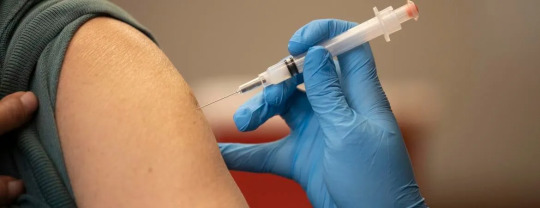
Scientists at UC Riverside have demonstrated a new, RNA-based vaccine strategy that is effective against any strain of a virus and can be used safely even by babies or the immunocompromised.
6. June - Bill Gates-backed startup creates Lego-like brick that can store air pollution for centuries

The Washington Post detailed a "deceptively simple" procedure by Graphyte to store a ton of CO2 for around $100 a ton, a number long considered a milestone for affordably removing carbon dioxide from the air. Direct air capture technologies used in the United States and Iceland cost $600 to $1,200 per ton, per the Post.
7. July - Stem cell therapy cures man with type 2 diabetes

A 59-year-old man had been suffering from diabetes for 25 years, needing more and more insulin every day to avoid slipping into a diabetic coma and was at risk of death. But then Chinese researchers cured his disease for the first time in the world. The patient received a cell transplant in 2021 and has not taken any medication since 2022.
8. August - Chinese drones will fly trash out of Everest slopes
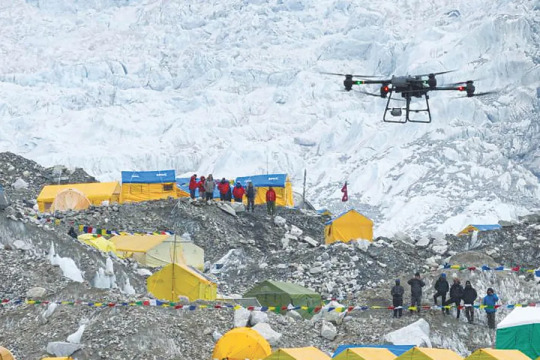
Come autumn, Nepal will deploy heavy lifter drones to transport garbage from the 6,812-metre tall Ama Dablam, south of Everest. This will be the first commercial work an unmanned aerial vehicle does in Nepal’s high-altitude zone.
9. November - Tokyo to make day care free to boost birth rate

Tokyo plans to make day care free for all preschool children starting in September, the city governor has announced as part of efforts to boost Japan's low birth rate.
10. October - FTC Rule Banning Fake Product Reviews Takes Effect With Stiff Penalties
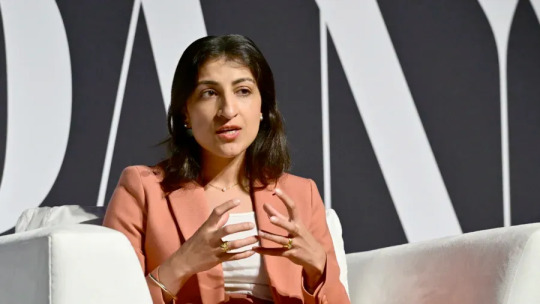
Federal Trade Commission (FTC) Chair Lina Khan announced on Oct. 21 that the agency’s prohibition on fake online reviews was taking effect, imposing fines as high as $50,000 for violations. Khan encouraged followers to report the proscribed practices at reportfraud.ftc.gov.
11. November - Bumblebee population increases 116 times over in 'remarkable' Scotland rewilding project

The bumblebee population has made an impressive comeback in a developed area by increasing to 116 times what it was two years ago thanks to a nature restoration group.
12. December - Spain to enshrine gay marriage and abortion rights into its constitution so 'they cannot be undone in the future'
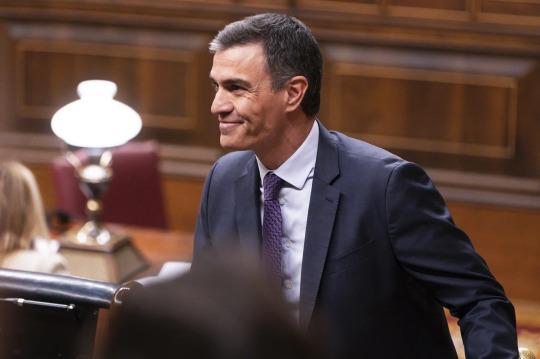
The left-wing PSOE leader made the announcement at an event marking the 46th anniversary of the Spanish Magna Carta.
“We believe that these are rights that we must protect in the Constitution so that no one can touch them in the future,” Sanchez said in a statement in parliament on Friday.
----------
That's it for last year :)
This newsletter will always be free. If you liked this post you can support me with a small kofi donation here:
Buy me a coffee ❤️
Also don’t forget to share this post with your friends.
460 notes
·
View notes
Text
Casting Ateez in a BL
Purely self-indulgent and a way for me to draw from my stores of BL knowledge (see my tags) and procrastinate on my actual work
Hongjoong
Hongjoong doesn't quite fit standard BL male lead visuals, yet he has shown himself to be intense, jealous, and possessive with atiny (and certain other members), which makes him a good fit for a cult fave Taiwanese BL. I would cast him in a Lin Pei Yu drama as a lead who secretly and furiously pines over his love interest for years, leading to an explosive moment of passionate intimacy, only to then ghost the love of his life for five years in order to prove himself worthy.
We Best Love 1 & 2 (Taiwan 2021)



Seonghwa
With Seonghwa's ability to draw from the emotional spectrum in his art (sadness, longing, grief, anger) and his unconventional yet staggering good looks, he would be a great fit for a Korean BL directed by my queen Hwang Da Seul. A show about the cost of aiming for perfection in a society that values beauty above all else. Seonghwa would definitely try for a more authentic depiction of queerness in a BL and would not be afraid of playing a messy character yearning for love.
Bleuming (Korea 2023)



Mingi
Given Mingi's penchant for pushing boundaries and zagging where others would zig, I see him fitting in with his new friend Up Poompat in a high-budget Thai BL adapted from a Chinese web novel. A show filled with questionable/downright problematic tropes and an incomprehensible plot, yet with great ratings due to its flashy visual style and high heat. Yes, I think Mingi would have a field day and charm the pants off everyone on the set.
My Stand-In (Thailand, 2024)



Yunho
Realistically, Yunho has the best chance of being cast in a Korean bromance drama like The Devil Judge or Beyond Evil, playing an honor-bound yet impressionable rookie who comes under the thrall of a mysterious and dangerous older mentor. However, we are casting him for BL and I think he would be perfectly suited for a Japanese BL filled with comfortable and nostalgic vignettes of everyday life and extended scenes of one character cooking for the other. His handsome, boy-next-door good looks would make him the ideal romantic lead who quietly devotes himself to his childhood friend-turned-roommate.
Living With Him (Japan, 2024)



Wooyoung
Has there ever been someone more suited to a pulpy Thai BL? I mean this as a compliment, of course. Yes, these shows have a reputation for being little more than sexy melodramas with poor production values, but I see the vision. Wooyoung's magnetism, swagger, and confidence would land him a show produced by Be On Cloud with great cinematography and a high-concept story held together by tape and glue. That wouldn't matter, because Wooyoung would get every advertiser of ice tea and printer ink to fund the show.
KinnPorsche (Thailand, 2022)



San
Yes, I know San was actually used as a visual reference for a character on KinnPorsche, but he would be playing it safe as a nice, strong, romantic lead in a New Siwaj-directed Thai BL. Physically, he embodies all the attributes of a seme, defined as the active pursuer in the narrative. He is the soft dom of our dreams, and would gently yet persistently woo our skittish ML while dealing with the emotional fallout of an intergenerational trauma that threatens his happily-ever-after.
P'DEEEAAAAAN!!!
Until We Meet Again (Thailand, 2019)



Yeosang
Yeosang is tough to cast, because we know he sees himself as a doberman while the world insists he's a maltese. Unfortunately, his angelic good looks and soft-spoken demeanor would make him catnip for a Koran BL casting director looking for the ideal uke (the passive resistor in the narrative). He would play a sweet-natured yet timed character with a tragic backstory desperate to be loved by the touch-too-possessive ML who has known him since childhood. The show would be inexpensive yet tastefully staged, with a soft and dreamy style. The chemistry would be awkward and unconvincing, but the visuals would do most of the heavy lifting. His co-star would dine out on fan-meetings for the next 2-3 years.
Cherry Blossoms After Winter (Korea, 2022) starring Ok Jin Uk, from the trot idol group SUPERFIVE



Jongho
This was the hardest casting, because Jongho is so emphatically anti-fan service. Yet his prickly appeal and fondness for weepy dramas makes me think he could tough it out in a melancholy Japanese BL. Despite a mean and grumpy demeanor, his big round eyes would fill with devastation as the person he loves is taken from him too soon, only to get him back with only enough time to say their goodbyes and learn something about acceptance and memory.
Eternal Yesterday (Japan, 2022)




I will happily hear your substitutions or recommendations.
#ateez#song mingi#jeong yunho#park seonghwa#choi san#kim hongjoong#jung wooyoung#kang yeosang#choi jongho#eternal yesterday#kinnporsche#kinnporche the series#cherry blossoms after winter#my stand in#living with him#kare no iru seikatsu#we best love#blueming#until we meet again#taiwanese bl#thai bl#japanese bl#korean bl
50 notes
·
View notes
Text
The antitrust case against Apple
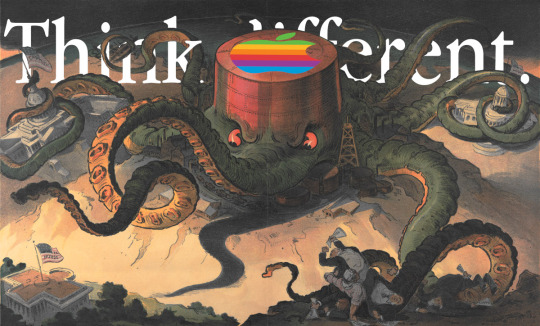
I'm on tour with my new, nationally bestselling novel The Bezzle! Catch me TONIGHT (Mar 22) in TORONTO, then SUNDAY (Mar 24) with LAURA POITRAS in NYC, then Anaheim, and beyond!

The foundational tenet of "the Cult of Mac" is that buying products from a $3t company makes you a member of an oppressed ethnic minority and therefore every criticism of that corporation is an ethnic slur:
https://pluralistic.net/2024/01/12/youre-holding-it-wrong/#if-dishwashers-were-iphones
Call it "Apple exceptionalism" – the idea that Apple, alone among the Big Tech firms, is virtuous, and therefore its conduct should be interpreted through that lens of virtue. The wellspring of this virtue is conveniently nebulous, which allows for endless goal-post shifting by members of the Cult of Mac when Apple's sins are made manifest.
Take the claim that Apple is "privacy respecting," which is attributed to Apple's business model of financing its services though cash transactions, rather than by selling it customers to advertisers. This is the (widely misunderstood) crux of the "surveillance capitalism" hypothesis: that capitalism is just fine, but once surveillance is in the mix, capitalism fails.
Apple, then, is said to be a virtuous company because its behavior is disciplined by market forces, unlike its spying rivals, whose ability to "hack our dopamine loops" immobilizes the market's invisible hand with "behavior-shaping" shackles:
http://pluralistic.net/HowToDestroySurveillanceCapitalism
Apple makes a big deal out of its privacy-respecting ethos, and not without some justification. After all, Apple went to the mattresses to fight the FBI when they tried to force Apple to introduced defects into its encryption systems:
https://www.eff.org/deeplinks/2018/04/fbi-could-have-gotten-san-bernardino-shooters-iphone-leadership-didnt-say
And Apple gave Ios users the power to opt out of Facebook spying with a single click; 96% of its customers took them up on this offer, costing Facebook $10b (one fifth of the pricetag of the metaverse boondoggle!) in a single year (you love to see it):
https://arstechnica.com/gadgets/2021/02/facebook-makes-the-case-for-activity-tracking-to-ios-14-users-in-new-pop-ups/
Bruce Schneier has a name for this practice: "feudal security." That's when you cede control over your device to a Big Tech warlord whose "walled garden" becomes a fortress that defends you against external threats:
https://pluralistic.net/2021/06/08/leona-helmsley-was-a-pioneer/#manorialism
The keyword here is external threats. When Apple itself threatens your privacy, the fortress becomes a prison. The fact that you can't install unapproved apps on your Ios device means that when Apple decides to harm you, you have nowhere to turn. The first Apple customers to discover this were in China. When the Chinese government ordered Apple to remove all working privacy tools from its App Store, the company obliged, rather than risk losing access to its ultra-cheap manufacturing base (Tim Cook's signal accomplishment, the one that vaulted him into the CEO's seat, was figuring out how to offshore Apple manufacturing to China) and hundreds of millions of middle-class consumers:
https://www.reuters.com/article/us-china-apple-vpn/apple-says-it-is-removing-vpn-services-from-china-app-store-idUSKBN1AE0BQ
Killing VPNs and other privacy tools was just for openers. After Apple caved to Beijing, the demands kept coming. Next, Apple willingly backdoored all its Chinese cloud services, so that the Chinese state could plunder its customers' data at will:
https://www.nytimes.com/2021/05/17/technology/apple-china-censorship-data.html
This was the completely foreseeable consequence of Apple's "curated computing" model: once the company arrogated to itself the power to decide which software you could run on your own computer, it was inevitable that powerful actors – like the Chinese Communist Party – would lean on Apple to exercise that power in service to its goals.
Unsurprisingly, the Chinese state's appetite for deputizing Apple to help with its spying and oppression was not sated by backdooring iCloud and kicking VPNs out of the App Store. As recently as 2022, Apple continued to neuter its tools at the behest of the Chinese state, breaking Airdrop to make it useless for organizing protests in China:
https://pluralistic.net/2022/11/11/foreseeable-consequences/#airdropped
But the threat of Apple turning on its customers isn't limited to China. While the company has been unwilling to spy on its users on behalf of the US government, it's proven more than willing to compromise its worldwide users' privacy to pad its own profits. Remember when Apple let its users opt out of Facebook surveillance with one click? At the very same time, Apple was spinning up its own commercial surveillance program, spying on Ios customers, gathering the very same data as Facebook, and for the very same purpose: to target ads. When it came to its own surveillance, Apple completely ignored its customers' explicit refusal to consent to spying, spied on them anyway, and lied about it:
https://pluralistic.net/2022/11/14/luxury-surveillance/#liar-liar
Here's the thing: even if you believe that Apple has a "corporate personality" that makes it want to do the right thing, that desire to be virtuous is dependent on the constraints Apple faces. The fact that Apple has complete legal and technical control over the hardware it sells – the power to decide who can make software that runs on that hardware, the power to decide who can fix that hardware, the power to decide who can sell parts for that hardware – represents an irresistible temptation to enshittify Apple products.
"Constraints" are the crux of the enshittification hypothesis. The contagion that spread enshittification to every corner of our technological world isn't a newfound sadism or indifference among tech bosses. Those bosses are the same people they've always been – the difference is that today, they are unconstrained.
Having bought, merged or formed a cartel with all their rivals, they don't fear competition (Apple buys 90+ companies per year, and Google pays it an annual $26.3b bribe for default search on its operating systems and programs).
Having captured their regulators, they don't fear fines or other penalties for cheating their customers, workers or suppliers (Apple led the coalition that defeated dozens of Right to Repair bills, year after year, in the late 2010s).
Having wrapped themselves in IP law, they don't fear rivals who make alternative clients, mods, privacy tools or other "adversarial interoperability" tools that disenshittify their products (Apple uses the DMCA, trademark, and other exotic rules to block third-party software, repair, and clients).
True virtue rests not merely in resisting temptation to be wicked, but in recognizing your own weakness and avoiding temptation. As I wrote when Apple embarked on its "curated computing" path, the company would eventually – inevitably – use its power to veto its customers' choices to harm those customers:
https://memex.craphound.com/2010/04/01/why-i-wont-buy-an-ipad-and-think-you-shouldnt-either/
Which is where we're at today. Apple – uniquely among electronics companies – shreds every device that is traded in by its customers, to block third parties from harvesting working components and using them for independent repair:
https://www.vice.com/en/article/yp73jw/apple-recycling-iphones-macbooks
Apple engraves microscopic Apple logos on those parts and uses these as the basis for trademark complaints to US customs, to block the re-importation of parts that escape its shredders:
https://repair.eu/news/apple-uses-trademark-law-to-strengthen-its-monopoly-on-repair/
Apple entered into an illegal price-fixing conspiracy with Amazon to prevent used and refurbished devices from being sold in the "world's biggest marketplace":
https://pluralistic.net/2022/11/10/you-had-one-job/#thats-just-the-as
Why is Apple so opposed to independent repair? Well, they say it's to keep users safe from unscrupulous or incompetent repair technicians (feudal security). But when Tim Cook speaks to his investors, he tells a different story, warning them that the company's profits are threatened by customers who choose to repair (rather than replace) their slippery, fragile glass $1,000 pocket computers (the fortress becomes a prison):
https://www.apple.com/newsroom/2019/01/letter-from-tim-cook-to-apple-investors/
All this adds up to a growing mountain of immortal e-waste, festooned with miniature Apple logos, that our descendants will be dealing with for the next 1,000 years. In the face of this unspeakable crime, Apple engaged in a string of dishonest maneuvers, claiming that it would support independent repair. In 2022, Apple announced a home repair program that turned out to be a laughably absurd con:
https://pluralistic.net/2022/05/22/apples-cement-overshoes/
Then in 2023, Apple announced a fresh "pro-repair" initiative that, once again, actually blocked repair:
https://pluralistic.net/2023/09/22/vin-locking/#thought-differently
Let's pause here a moment and remember that Apple once stood for independent repair, and celebrated the independent repair technicians that kept its customers' beloved Macs running:
https://pluralistic.net/2021/10/29/norwegian-potato-flour-enchiladas/#r2r
Whatever virtue lurks in Apple's corporate personhood, it is no match for the temptation that comes from running a locked-down platform designed to capture IP rights so that it can prevent normal competitive activities, like fixing phones, processing payments, or offering apps.
When Apple rolled out the App Store, Steve Jobs promised that it would save journalism and other forms of "content creation" by finally giving users a way to pay rightsholders. A decade later, that promise has been shattered by the app tax – a 30% rake on every in-app transaction that can't be avoided because Apple will kick your app out of the App Store if you even mention that your customers can pay you via the web in order to avoid giving a third of their content dollars to a hardware manufacturer that contributed nothing to the production of that material:
https://www.eff.org/deeplinks/2023/06/save-news-we-must-open-app-stores
Among the apps that Apple also refuses to allow on Ios is third-party browsers. Every Iphone browser is just a reskinned version of Apple's Safari, running on the same antiquated, insecure Webkit browser engine. The fact that Webkit is incomplete and outdated is a feature, not a bug, because it lets Apple block web apps – apps delivered via browsers, rather than app stores:
https://pluralistic.net/2022/12/13/kitbashed/#app-store-tax
Last month, the EU took aim at Apple's veto over its users' and software vendors' ability to transact with one another. The newly in-effect Digital Markets Act requires Apple to open up both third-party payment processing and third-party app stores. Apple's response to this is the very definition of malicious compliance, a snake's nest of junk-fees, onerous terms of service, and petty punitive measures that all add up to a great, big "Go fuck yourself":
https://pluralistic.net/2024/02/06/spoil-the-bunch/#dma
But Apple's bullying, privacy invasion, price-gouging and environmental crimes are global, and the EU isn't the only government seeking to end them. They're in the firing line in Japan:
https://asia.nikkei.com/Business/Technology/Japan-to-crack-down-on-Apple-and-Google-app-store-monopolies
And in the UK:
https://www.gov.uk/government/news/cma-wins-appeal-in-apple-case
And now, famously, the US Department of Justice is coming for Apple, with a bold antitrust complaint that strikes at the heart of Apple exceptionalism, the idea that monopoly is safer for users than technological self-determination:
https://www.justice.gov/opa/media/1344546/dl?inline
There's passages in the complaint that read like I wrote them:
Apple wraps itself in a cloak of privacy, security, and consumer preferences to justify its anticompetitive conduct. Indeed, it spends billions on marketing and branding to promote the self-serving premise that only Apple can safeguard consumers’ privacy and security interests. Apple selectively compromises privacy and security interests when doing so is in Apple’s own financial interest—such as degrading the security of text messages, offering governments and certain companies the chance to access more private and secure versions of app stores, or accepting billions of dollars each year for choosing Google as its default search engine when more private options are available. In the end, Apple deploys privacy and security justifications as an elastic shield that can stretch or contract to serve Apple’s financial and business interests.
After all, Apple punishes its customers for communicating with Android users by forcing them to do so without any encryption. When Beeper Mini rolled out an Imessage-compatible Android app that fixed this, giving Iphone owners the privacy Apple says they deserve but denies to them, Apple destroyed Beeper Mini:
https://blog.beeper.com/p/beeper-moving-forward
Tim Cook is on record about this: if you want to securely communicate with an Android user, you must "buy them an Iphone":
https://www.theverge.com/2022/9/7/23342243/tim-cook-apple-rcs-imessage-android-iphone-compatibility
If your friend, family member or customer declines to change mobile operating systems, Tim Cook insists that you must communicate without any privacy or security.
Even where Apple tries for security, it sometimes fails ("security is a process, not a product" -B. Schneier). To be secure in a benevolent dictatorship, it must also be an infallible dictatorship. Apple's far from infallible: Eight generations of Iphones have unpatchable hardware defects:
https://checkm8.info/
And Apple's latest custom chips have secret-leaking, unpatchable vulnerabilities:
https://arstechnica.com/security/2024/03/hackers-can-extract-secret-encryption-keys-from-apples-mac-chips/
Apple's far from infallible – but they're also far from benevolent. Despite Apple's claims, its hardware, operating system and apps are riddled with deliberate privacy defects, introduce to protect Apple's shareholders at the expense of its customers:
https://proton.me/blog/iphone-privacy
Now, antitrust suits are notoriously hard to make, especially after 40 years of bad-precedent-setting, monopoly-friendly antitrust malpractice. Much of the time, these suits fail because they can't prove that tech bosses intentionally built their monopolies. However, tech is a written culture, one that leaves abundant, indelible records of corporate deliberations. What's more, tech bosses are notoriously prone to bragging about their nefarious intentions, committing them to writing:
https://pluralistic.net/2023/09/03/big-tech-cant-stop-telling-on-itself/
Apple is no exception – there's an abundance of written records that establish that Apple deliberately, illegally set out to create and maintain a monopoly:
https://www.wired.com/story/4-internal-apple-emails-helped-doj-build-antitrust-case/
Apple claims that its monopoly is beneficent, used to protect its users, making its products more "elegant" and safe. But when Apple's interests conflict with its customers' safety and privacy – and pocketbooks – Apple always puts itself first, just like every other corporation. In other words: Apple is unexceptional.
The Cult of Mac denies this. They say that no one wants to use a third-party app store, no one wants third-party payments, no one wants third-party repair. This is obviously wrong and trivially disproved: if no Apple customer wanted these things, Apple wouldn't have to go to enormous lengths to prevent them. The only phones that an independent Iphone repair shop fixes are Iphones: which means Iphone owners want independent repair.
The rejoinder from the Cult of Mac is that those Iphone owners shouldn't own Iphones: if they wanted to exercise property rights over their phones, they shouldn't have bought a phone from Apple. This is the "No True Scotsman" fallacy for distraction-rectangles, and moreover, it's impossible to square with Tim Cook's insistence that if you want private communications, you must buy an Iphone.
Apple is unexceptional. It's just another Big Tech monopolist. Rounded corners don't preserve virtue any better than square ones. Any company that is freed from constraints – of competition, regulation and interoperability – will always enshittify. Apple – being unexceptional – is no exception.

Name your price for 18 of my DRM-free ebooks and support the Electronic Frontier Foundation with the Humble Cory Doctorow Bundle.

If you'd like an essay-formatted version of this post to read or share, here's a link to it on pluralistic.net, my surveillance-free, ad-free, tracker-free blog:
https://pluralistic.net/2024/03/22/reality-distortion-field/#three-trillion-here-three-trillion-there-pretty-soon-youre-talking-real-money
#pluralistic#apple#antitrust#cult of mac#ios#mobile#app tax#infosec#feudal security#doj#jonathan kanter#doj v apple#big tech#trustbusting#monopolies#app stores#technofeudalism#technomaorialism#privacy#right to repair#corruption
239 notes
·
View notes
Text



“Name me a single objective we’ve ever set out to accomplish that we’ve failed on. Name me one, in all of our history. Not one!”
-President Joe Biden, August 16, 2023
Joe Biden in one of his now accustomed angry “get off my grass” moods dared the press to find just one of his policies/objectives that has not worked. Silence followed.
Perhaps it was polite to say nothing, given even the media knows almost every enacted Biden policy has failed.
Here is a summation of what he should instead apologize for.
Biden in late summer 2021 sought a 20th anniversary celebration of 9/11 and the 2001 subsequent invasion of Afghanistan. He wished to be the landmark president that yanked everyone out of Afghanistan after 20 years in country. But the result was the greatest military humiliation of the United States since the flight from Vietnam in 1975.
Consider the ripples of Biden’s disaster. U.S. deterrence was crippled worldwide. China, Russia, Iran, and North Korea almost immediately began to bluster or return to their chronic harassment of U.S. and allied ships and planes. We left thousands of allied Afghans to face Taliban retribution, along with some Western contractors.
Biden abandoned a $1 billion embassy, and a $300 million remodeled Bagram airbase strategically located not far from China and Russia, and easily defensible. Perhaps $50 billion in U.S. weaponry and supplies were abandoned and now find their way into the international terrorist mart.
All our pride flags, our multimillion gender studies programs at Kabul University, and our George Floyd murals did not just come to naught, but were replaced by the Taliban’s anti-homosexual campaigns, burkas, and detestation of any trace of American popular culture.
Vladimir Putin sized up the skedaddle. He collated it with Biden’s unhinged quip that he would not get too excited if Putin just staged a “minor” invasion of Ukraine. He remembered Biden’s earlier request to Putin to modulate Russian hacking to exempt a few humanitarian American institutions. Then Russia concluded of our shaky Commander-in-Chief that he either did not care or could do nothing about another Russian invasion.
The result so far is more than 500,000 dead and wounded in the war, a Verdun-stand-off along with fortified lines, the steady depletion of our munitions and weapon stocks, and a new China/Russia/Iran/North Korean axis, with wink and nod assistance from NATO Turkey.
Biden blew up the Abraham accords, nudged Saudi Arabia and the Gulf States over to the dark side of Iran, China, and Russia. He humiliated the U.S. on the eve of the midterms by callously begging the likes of Iran, Venezuela, Russia, and Saudi Arabia to pump more oil that he had damned as unclean at home and cut back its production. In Bidenomics, instead of producing oil, the president begs autocracies to export it to us at high prices while he drains the nation’s strategic petroleum reserve for short-term political advantage.
Biden deliberately alienated Israel by openly interfering in its domestic politics. He pursued the crackpot Iran Deal while his special Iranian envoy was removed for disclosing classified information.
No one can explain why Biden ignored the Chinese balloon espionage caper, kept mum about the engineered Covid virus that escaped the Wuhan lab, said not a word about a Chinese biolab discovered in rural California, and had his envoys either bow before Chinese leaders or take their insults in silence—other than he is either cognitively challenged or leveraged by his decade-long grifting partnership with his son Hunter.
Yet another Biden’s legacy will be erasing the southern border and with it, U.S. immigration law. Over seven million aliens simply crossed into the U.S. illegally with Biden’s tacit sanction—without audits, background checks, vaccinations, and COVID testing, much less English fluency, skills, or high-school diplomas.
Biden’s only immigration accomplishment was to render the entire illegal sanctuary city movement a cruel joke. Given the flood, mostly rich urban and vacation home dwellers made it very clear that while they fully support millions swarming into poor Latino communities of southern Texas and Arizona, they do not want any illegal aliens fouling their carefully cultivated nests.
Biden is mum about the 100,000 fentanyl deaths from cartel-imported and Chinese-supplied drugs across his open border. He seems to like the idea that Mexican President Obrador periodically mouths off, ordering his vast expatriate community to vote Democratic and against Trump.
Despite all the pseudo-blue collar dissimulation about Old Joe Biden from Scranton, he has little empathy for the working classes. Indeed, he derides them as chumps and dregs, urges miners to learn coding as the world covets their coal, and studiously avoids getting anywhere near the toxic mess in East Palestine, Ohio, or so far the moonscape on Maui.
Bidenomics is a synonym for printing up to $6 billion dollars at precisely the time post-Covid consumer demand was soaring, while previously dormant supply chains were months behind rebooting production and transportation. Biden is on track to increase the national debt more than any one-term president.
In Biden’s weird logic, if he raised the price of energy, gasoline, and key food staples 20-30 percent since his inauguration without a commensurate rise in wages, and then saw the worst inflation in 40 years occasionally decline from record highs one month to the next, then he “beat inflation.”
But the reason why more than 60 percent of the nation has no confidence in Bidenomics is because it destroyed their household budgets. Gas is nearly twice what it was in January 2021. Interest rates have about tripled. Key staple foods are often twice as costly—meat, vegetables, and fruits especially.
Biden has ended through his weaponized Attorney General Merrick Garland the age-old American commitment to equal justice under the law. The FBI, DOJ, CIA, and IRS are hopelessly politically compromised. Many of their bureaucrats serve as retrieval agents for lost Biden family incriminating laptops, diaries, and guns. In sum, Biden criminalized opposing political views.
Biden has unleashed the administrative state for the first time in history to destroy the Republican primary front runner and his likely opponent. His legacy will be the corruption of U.S. jurisprudence and the obliteration of the American reputation for transparent permanent government that should be always above politics, bribery, and corruption.
If in the future, an on-the-make conservative prosecutor in West Virginia, Utah, or Mississippi wishes to make a national name, then he has ample precedent to indict a Democrat President for receiving bad legal advice, questioning the integrity of an election, or using social media to express doubt that the new non-Election-Day balloting was on the up-and-up, or supposedly overvaluing his real estate.
The Biden family’s decade-long family grifting will likely expose Joe Biden as the first president in U.S. history who fitted precisely the Constitution’s definition of impeachment and removal—given his “high crimes and misdemeanors” appear “bribery”-related. If further evidence shows he altered U.S. foreign policy in accordance with the wishes from his benefactors in Ukraine, China, or Romania, then he committed constitutionally-defined “treason” as well.
Defunding the police, and pandemics of exempted looting, shoplifting, smashing, and grabbing, and carjacking merit no administrative attention. Nor does the ongoing systematic destruction of our blue bicoastal cities, Los Angeles, New York, Portland, San Francisco, Seattle, and Washington, D.C. All that, along with the disasters in East Palestine or Maui are out of sight, out of mind from a day at the beach at Biden’s mysteriously purchased nearly 6,000 square-foot beachfront mansion.
Biden ran on Barack Obama-like 2004 rhetoric (“Well, I say to them tonight, there is not a liberal America and a conservative America — there is the United States of America).”
And like Obama, he used that ecumenical sophistry to gain office only to divide further the U.S. No sooner than he was elected, we began hearing from the great unifier eerie screaming harangues about “semi-fascists” and “ultra-MAGA” dangerous zealots, replete with red-and black Phantom of the Opera backdrops.
What followed the unifying rhetoric was often amnesties and exemptions for violent offenders during the 120 days of rioting, looting, killing, and attacks on police officers in summer 2020. In contrast, his administration lied when it alleged that numerous officers had died at the hands of the January 6 rioters. In addition, the Biden administration mandated long-term incarceration of many who committed no illegal act other than acting like buffoons and “illegally parading.”
The message was exemptions for torching a federal courthouse, a police precinct, or historic church or attempting to break into the White House grounds to get a president and his family—but long prison terms for wearing cow horns, a fur vest, and trespassing peacefully like a lost fool in the Capitol.
Finally, Biden’s most glaring failure was simply being unpresidential. He snaps at reporters, and shouts at importune times. He can no longer read off a big-print teleprompter. Even before a global audience, he cannot kick his lifelong creepy habit of turkey-gobbling on children necks, blowing into their ears and hair of young girls, and squeezing women far too long and far too hard.
His frailty redefined American presidential campaigning as basement seclusion and outsourcing propaganda to the media. And his disabilities only intensified during his presidency. Biden begins his day late and quits early. He has recalibrated the presidency as a 5-hour, 3-day a week job.
If Trump was the great exaggerator, Biden is our foremost liar. Little in his biography can be fully believed. He lies about everything from his train rides to the death of his son to his relationship with Biden-family foreign collaborators, to vaccinations to the economy. Anytime Biden mentions places visited, miles flown, or rails ridden, he is likely lying.
Biden continues with impunity because the media feels that a mentally challenged fabulist is preferable to Donald Trump and so contextualizes or ignores his falsehoods. Never has a U.S. president fallen and stumbled or gotten lost on stage so frequently—or been a single small trip away from incapacity.
So, yes, Biden’s initiatives have succeeded only in the sense of becoming successfully enacted—and therefore nearly destroying the country.
542 notes
·
View notes
Note
that garage kit umbrella miku ate. do you have a list of mikus with the wildest hair?
Good Smile are cowards honestly, no more sailor suits, the people want umbrella leg (singular)
I've made a post before HERE about ones with creative hairstyles but here are a few more that give her hair some zest (^ω~)
The swirly swirls of these figures hair are always fun to look at
I like how this Digital Stars one uses them and their shape to convey a Vibe(tm)
and the Chinese New Year ones always seem to do something cool with it
58 notes
·
View notes